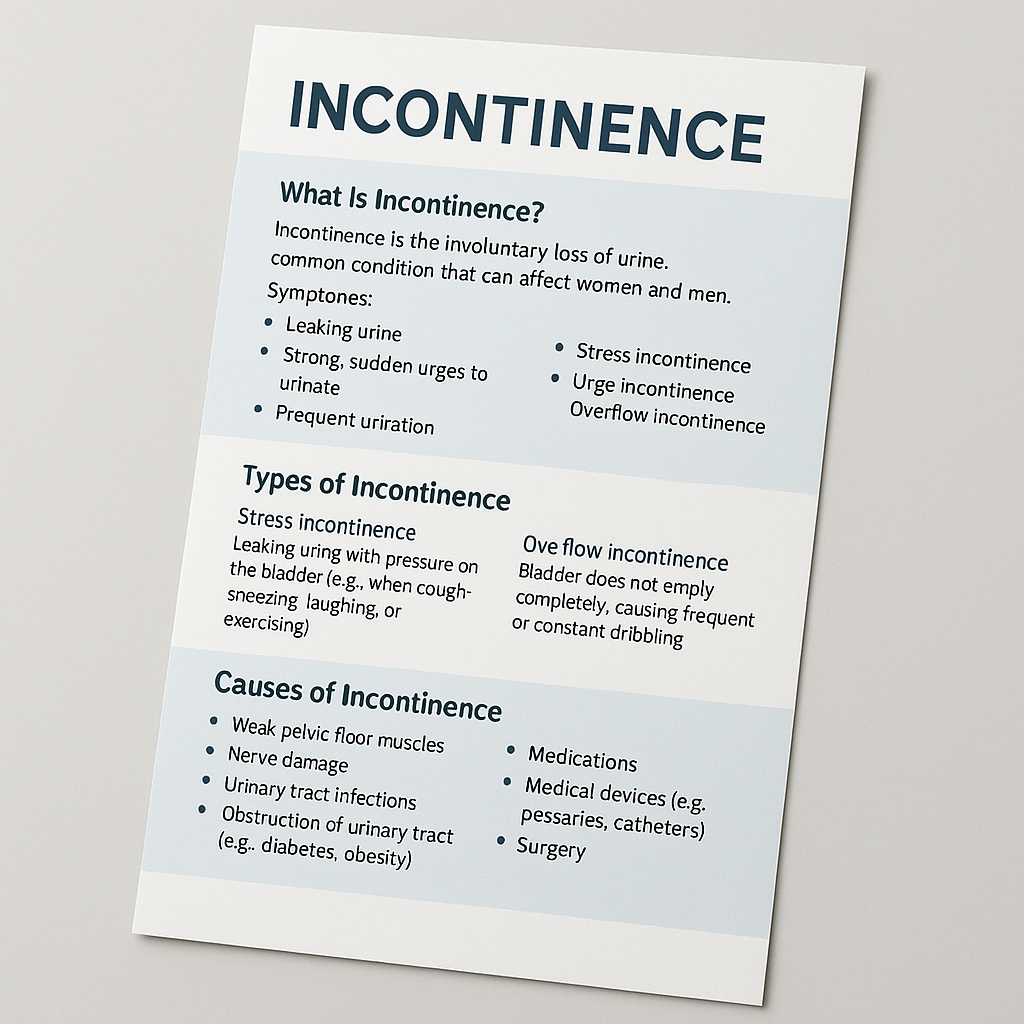Understanding the Causes of Urinary Incontinence in Women

Urinary incontinence—the involuntary leakage of urine—is one of the most common yet under-discussed health issues women face. Studies suggest that nearly 1 in 3 women will experience some degree of incontinence in their lifetime, especially as they get older or after childbirth. Despite how widespread it is, many women suffer in silence, feeling embarrassed or assuming it is simply part of aging. At Sheen Vein (Aesthetics and Functional Medicine) in St. Louis, we want women to know that incontinence is not something you have to live with. By understanding the underlying causes, we can help you find personalized solutions to regain confidence and quality of life.
What is Urinary Incontinence?
Urinary incontinence occurs when the bladder loses control, resulting in leaks during activities such as coughing, sneezing, laughing, or even walking. It can also present as a sudden, urgent need to urinate that doesn’t allow enough time to reach the bathroom.
There are different types of urinary incontinence:
- Stress incontinence – leakage during physical stress such as coughing, exercise, or lifting.
- Urge incontinence – sudden overwhelming urge to urinate, often related to overactive bladder.
- Mixed incontinence – a combination of both stress and urge incontinence.
- Overflow incontinence – when the bladder doesn’t empty completely, causing dribbling.
Understanding the type of incontinence is the first step to effective treatment. But what causes this condition in women?
Common Causes of Urinary Incontinence in Women
1. Pregnancy and Childbirth
Pregnancy puts tremendous pressure on the pelvic floor muscles and bladder. Vaginal delivery, especially multiple births or complicated deliveries, can stretch and weaken the muscles and nerves that control urination. This can lead to stress incontinence that may persist for years if not addressed.
2. Menopause and Hormonal Changes
Estrogen plays an important role in maintaining the strength and elasticity of pelvic tissues. After menopause, declining estrogen levels can thin the urethral lining and weaken surrounding muscles, making leakage more likely. This is why urinary incontinence often becomes more pronounced during midlife.
3. Weak Pelvic Floor Muscles
The pelvic floor is a group of muscles that support the bladder, uterus, and rectum. When these muscles are weakened by aging, pregnancy, or inactivity, they may fail to properly control the release of urine. Pelvic floor weakness is one of the most common root causes of urinary incontinence in women.
4. Nerve Damage
Nerves control bladder signaling. If the nerves are damaged—due to childbirth, diabetes, multiple sclerosis, or even pelvic surgery—the bladder may contract unexpectedly or fail to empty completely. This can contribute to both urge and overflow incontinence.
5. Overactive Bladder (OAB)
With OAB, the bladder muscle contracts too often or without warning, creating sudden urges to urinate. Women may find themselves needing the bathroom frequently, including at night, disrupting sleep and daily life.
6. Pelvic Organ Prolapse
When pelvic floor muscles weaken significantly, organs such as the bladder, uterus, or rectum can slip downward into the vaginal space. This prolapse often contributes to urinary leakage, as the bladder and urethra no longer maintain proper positioning.
7. Lifestyle and Medical Conditions
Certain factors increase the risk of incontinence:
- Obesity – excess weight increases abdominal pressure on the bladder.
- Chronic coughing – from smoking, asthma, or COPD.
- Constipation – straining can weaken pelvic support over time.
- Urinary tract infections – may temporarily worsen urgency and frequency.
- Medications – diuretics and some blood pressure medications can increase urinary frequency.
Emotional Impact of Urinary Incontinence
While urinary incontinence is a physical issue, it also has significant emotional effects. Women often describe:
- Avoiding exercise or social gatherings out of fear of leaks
- Difficulty traveling or being away from a bathroom
- Embarrassment or decreased intimacy in relationships
- Anxiety or depression from ongoing symptoms
At Sheen Vein, we always emphasize that incontinence is not a personal failing. It is a medical condition with clear causes, and treatment can make a dramatic difference.
Functional Medicine Perspective
A functional medicine approach looks beyond symptoms to identify root causes. For urinary incontinence, this might involve:
- Hormone evaluation – addressing low estrogen or testosterone that affect tissue strength
- Nutritional support – optimizing magnesium, vitamin D, and other nutrients that support muscle and nerve function
- Pelvic floor health – recommending physical therapy, pelvic strengthening, or advanced treatments like laser therapy
- Lifestyle factors – addressing obesity, constipation, or chronic coughing that strain the bladder
By integrating medical therapies with lifestyle and regenerative medicine, we create personalized solutions that target the underlying issues.
Treatment Options
Depending on the type and severity of incontinence, treatments may include:
- Pelvic floor therapy (Kegel exercises, biofeedback)
- Hormone optimization during or after menopause
- Lifestyle changes (weight management, smoking cessation, bladder training)
- Medications for overactive bladder symptoms
- Advanced therapies, such as Fotona laser vaginal rejuvenation, which uses gentle laser energy to strengthen tissues and improve bladder support
At Sheen Vein (Aesthetics and Functional Medicine) in St. Louis, we often combine therapies to achieve the best results, always tailoring treatment to each woman’s unique health profile.
When to Seek Help
If urinary leakage is interfering with daily activities, disrupting sleep, or impacting your confidence, it’s time to seek medical evaluation. Incontinence is not just “part of getting older”—it’s a treatable condition. Early evaluation allows for more effective and less invasive treatment.
The Bottom Line
Urinary incontinence in women is caused by a combination of factors including pregnancy, menopause, weak pelvic floor muscles, nerve changes, and lifestyle influences. While common, it is not something women should accept as inevitable.
At Sheen Vein (Aesthetics and Functional Medicine) in St. Louis, we take a compassionate, functional medicine approach to uncover the causes and provide effective, personalized treatment options. With the right care, women can regain control, confidence, and freedom in their daily lives.